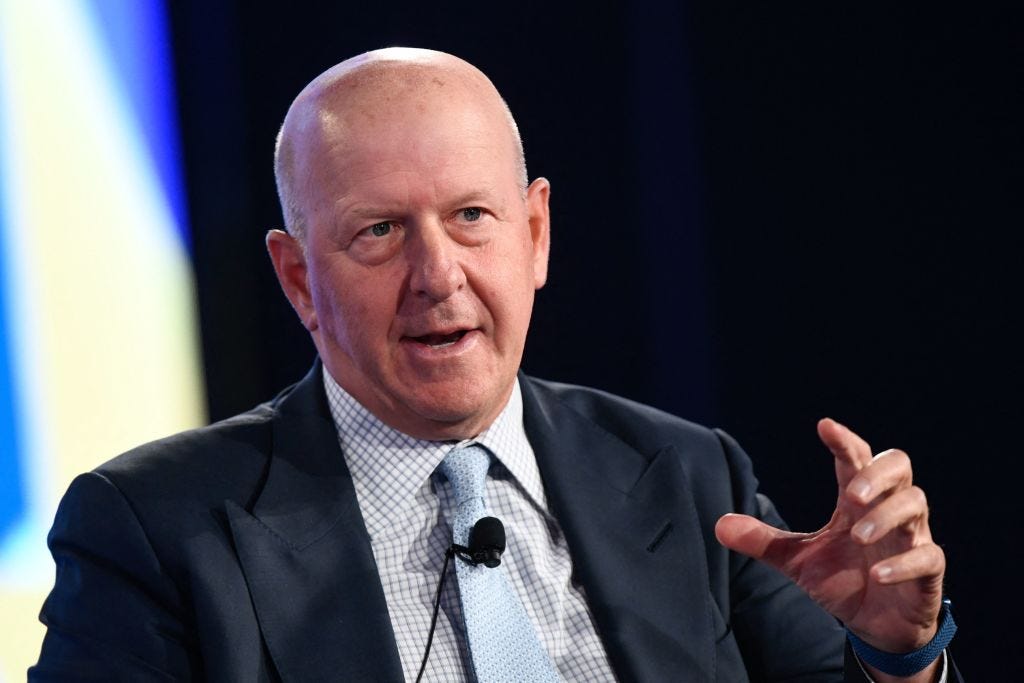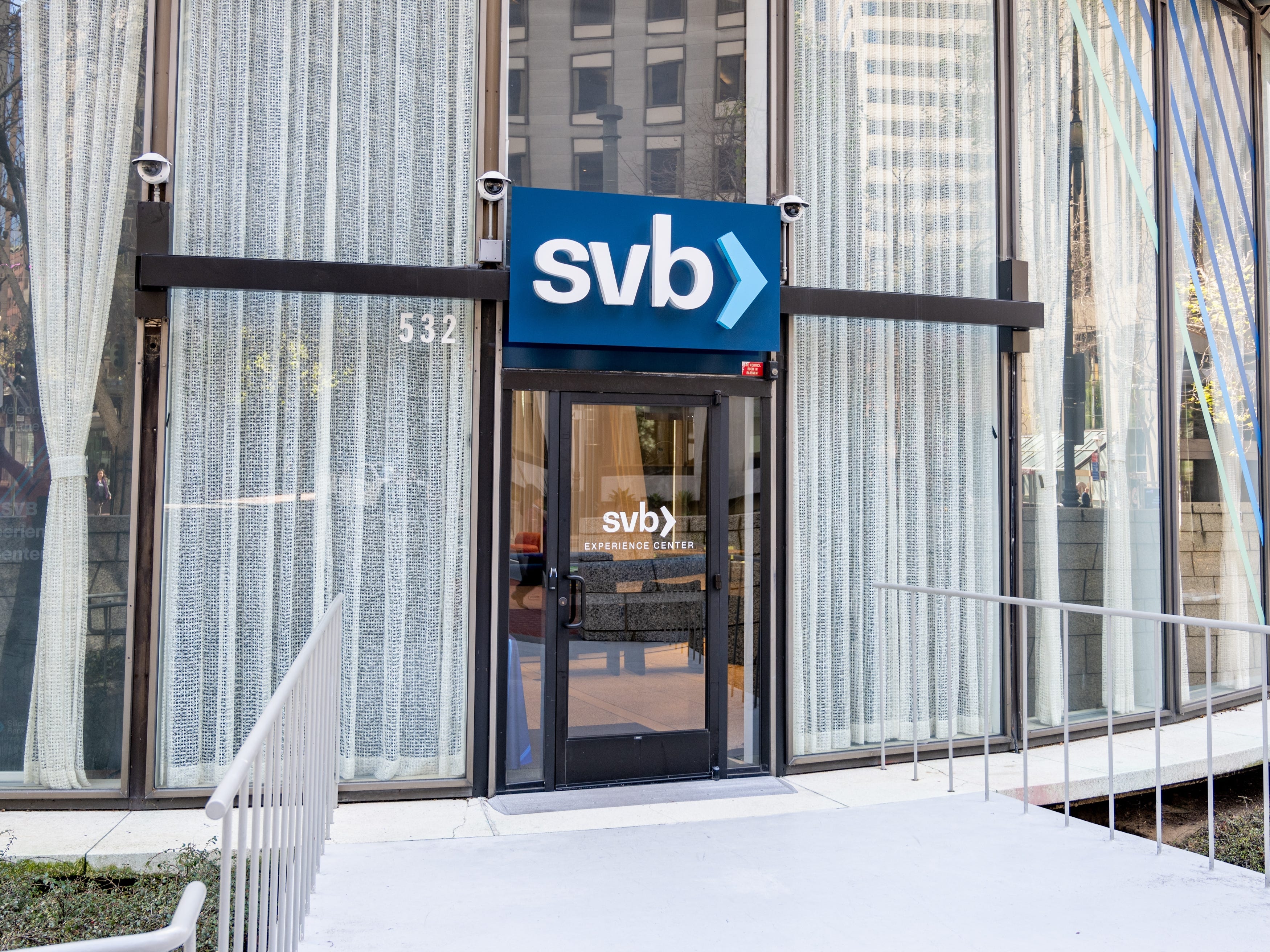
Michael M. Santiago/Getty Images
From a startup’s earliest stages through its hopeful exit, founders need banks — to manage the company’s money, negotiate favorable deals, and minimize financial headaches along the way.
Business Insider asked 15 investors and founders to nominate the best banks doing business with startups in 2025. Most of the people asked to remain anonymous to preserve their existing banking relationships.
Some VCs said that when working with a bank on discreet transactions, especially for small to midsize M&A, choosing a highly specialized individual banker should be the top priority.
“You want to hire a banker who really knows your industry,” said Micah Rosenbloom, a managing partner at Founder Collective. “In a lot of these cases, the ‘who’ matters more than the firm.”
For other aspects of banking, however, from managing checking accounts to negotiating a public listing, a bank’s broader practice and client network can often take precedent.
More banks have been stepping up to provide high-touch services to startups and venture funds, especially after Silicon Valley Bank’s 2023 collapse. HSBC and Citizens Bank, for example, two banks that didn’t make this list, have hired numerous SVB alums to pick up venture-backed clients and serve the growing innovation economy.
These are the 10 banks that emerged from founders’ and VCs’ picks as top partners for commercial banking, debt lending, capital raises, M&A, and IPOs.
Allen & Company

Brendan McDermid/Reuters
Best for: M&A and fundraising
Why it’s on this list: Boutique investment bank Allen & Company keeps a notoriously low profile. The firm, which was founded in the early 1920s, has no website or public contact information.
Instead, the New York-based bank prides itself on its singular focus on nurturing industry relationships. It’s perhaps best known for its annual Sun Valley Conference, the “summer camp for billionaires” where deal talks abound.
Investors said the bank’s deep network in tech, media, and finance has kept Allen & Co in the flow of hot M&A deals and, occasionally, venture fundraises.
Due to the bank’s secretive nature, there’s scant public information about specific deals Allen & Co has worked on. So far this year, according to PitchBook, the only transactions the bank has publicly been associated with were T-Mobile’s acquisitions of Blis, for $175 million, and Vistar Media, for an undisclosed amount.
Allen & Company didn’t respond to a request for comment for this story.
Axom Partners

Axom Partners
Best for: Small to midsize sell-side M&A
Why it’s on this list: Started just two years ago by three former Qatalyst bankers, Axom Partners is making a name for itself by leading some hot software and AI deals.
The tech-focused boutique investment bank has focused on helping earlier-stage venture-backed startups sell themselves. In the AI boom, they’ve done several deals with AI infrastructure and application companies. “They’re in the flow of a lot of interesting AI things going on in the market right now,” one investor said.
This year, Axom advised Eppo on its $220 million sale to Datadog in May and VoyageAI on its $220 million sale to MongoDB in February. The bank also worked on OctoAI’s sale to Nvidia and Rockset’s sale to OpenAI last year.
Axom is picking up top talent along the way, including hiring software-focused dealmaker Buzz Black from Morgan Stanley in March.
Axom Partners didn’t respond to requests for comment for this story.
Citi

Drew Angerer/Getty Images
Best for: International commercial banking
Why it’s on this list: For startups with an extensive international footprint, managing bills and payroll across multiple countries can be a huge hassle.
One founder said Citi has been a great partner in helping his company minimize that problem. Citi is generally cited as the bank with the broadest global network, offering services in nearly 180 countries with an on-the-ground presence in over 90 countries and jurisdictions.
Working with Citi means the startup doesn’t have to open checking accounts with multiple different banks across different countries, which also helps the company more easily tackle tasks like compliance audits, the founder said.
Citi said it targets clients with annual revenues between $10 million and $3 billion. Wyatt Crowell, head of Citi’s North American commercial bank segment, said that the bank aims to connect midsize companies with all of its products, from cash management to investment banking.
Goldman Sachs

Patrick T. Fallon/AFP via Getty Images
Best for: IPOs and large M&A
Why it’s on this list: Goldman Sachs is the oldest bank on this list, with an over 150-year reputation that precedes it. Its brand makes it a valuable partner for top tech companies seeking an IPO, investors and founders said.
Sources said that because many top-tier public investors bank with Goldman in some capacity, the firm is particularly skilled at connecting pre-IPO companies with the right investors for their listings. One tech founder said Goldman is “probably the best of the big three” at helping pre-IPO startups build relationships with public investors, referring to the top three investment banks in the US: Goldman, JPMorgan, and Morgan Stanley.
That network also makes it easier for the bank to find the right buyer for companies looking to sell themselves in large M&A transactions, investors said.
Goldman has served as a bookrunner on IPOs including Chime, Figma, and CoreWeave’s listings this year, and advised on large sell-side transactions like Wiz’s $32 billion sale to Alphabet, announced in March.
An investor said that while Goldman’s scale can make its banking offerings less personalized for some startups, “their name just goes such a long way.”
Goldman Sachs declined to comment for this story.
JPMorgan Chase

Michel Euler/Pool/AFP via Getty Images
Best for: Growth-stage banking and IPOs
Why it’s on its list: JPMorgan Chase is the largest bank in the US and the largest in the world by market cap.
VCs and founders said the bank’s scale makes it particularly adept at managing large transactions, especially initial public offerings. This year, JPMorgan has supported some of tech’s top IPOs, serving as the primary underwriter on Circle’s IPO and contributing to Chime, Figma, and CoreWeave‘s listings.
Founders and investors said JPMorgan is also a great partner for pre-IPO startups looking to make acquisitions. And because JPMorgan Chase offers a full suite of commercial and investment banking services for early-stage companies through IPO and beyond, the bank can adapt to its clients’ evolving needs. Sami Inkinen, the founder of pre-IPO diabetes company Virta Health, said the bank is “positively aggressive and flexible in servicing growth companies.”
Opinions on JPMorgan Chase’s commercial banking offerings for startups were more mixed. While founders like Inkinen cited positive commercial banking experiences with JPMorgan, others said its status as a bulge-bracket bank can box out smaller startups in favor of higher-profile, high-growth players. One founder said it can be “difficult to get [JPMorgan] interested in working with you.”
Founders and investors agreed that JPMorgan appears to have invested more than its bulge-bracket peers in serving venture-backed startups throughout their lifecycles. The bank saw “tremendous growth” in startups rushing to work with JPMorgan in 2023 after SVB’s collapse, and rapidly expanded into new products, people, geographies, and sectors to support them, said Andrew Kresse, cohead of JPMorgan’s innovation economy unit. That business now has over 550 bankers globally, working with over 11,000 venture-backed companies.
“The companies, founders, and VCs who make up the innovation economy require tailored solutions and services to help them navigate growth and excel in competitive and innovative industries,” Kresse and fellow innovation economy cohead John China said in a statement to BI.
“JPMorgan provides unmatched capabilities to this critical sector and we’re committed to serving companies of all sizes — from the earliest stage startups to scaled companies — with 360-degree coverage across commercial banking, investment banking and the private bank.”
Mercury Technologies

Mercury
Best for: Commercial banking
Why it’s on this list: Mercury is the only company on this list that isn’t actually a bank, but a fintech platform that provides online banking services.
Founded in 2017, Mercury has been gaining traction with startups and tech founders. Multiple founders and VCs named Mercury a top choice for startups prioritizing customizable, easy-to-use online banking.
Dave McClure, the founder and managing partner of Practical Venture Capital, an investor in Mercury, said the company has seen many startups flock to its platform following Silicon Valley Bank’s collapse in 2023.
McClure said Mercury offers “overall a better fit for startups and tech folks” due to its user-friendly interface, tools for automating tasks like AI-powered bill payment categorizations and expense management, and seamless integrations with other fintech software and financial institutions.
Mercury is venture-backed itself, most recently raising a $300 million Series C round led by Sequoia Capital. The company told BI it serves more than 200,000 across industries, including startups, VC firms, and small businesses.
One VC said that because Mercury is relatively young, its longevity will depend on the company’s ability to continue to meet the needs of startups as they grow.
Morgan Stanley

Jeenah Moon / Reuters
Best for: IPOs and large M&A
Why it’s on this list: Investment banking heavyweight Morgan Stanley has long been a key player in large M&A and IPOs.
When it comes to tech IPO advisory, specifically, some VCs and founders said Morgan Stanley is outdoing its peers. Investors cited the high quality of its tech investment banking team, pointing to its successes in understanding private companies deeply to create resonant narratives for public investors.
Many of the biggest tech companies to go public this year seem to agree. Morgan Stanley has served as the lead left bookrunner on eight tech IPOs in the US so far this year, including Figma, CoreWeave, Chime, and Hinge Health.
The bank has also advised on several multibillion-dollar M&A deals in 2025, including Intel’s sale of Altera’s majority stake to Silver Lake and GTCR’s sale of Worldpay to Global Payments, both in April.
“Fueled by new waves of innovation across AI, software, and semiconductors, the technology M&A and capital markets have shifted into high gear,” said Drew Guevara, cohead of global technology investment banking at Morgan Stanley. “Morgan Stanley is proud to partner with many of the leading companies, who are driving value creation throughout the global economy.”
Qatalyst Partners

Qatalyst Partners
Best for: Large sell-side M&A
Why it’s on this list: Qatalyst Partners is well-known in VC circles for leading top-dollar tech acquisitions.
The San Francisco-based boutique bank was founded in 2008 by Frank Quattrone, a longtime tech investment banker who previously led the tech banking groups at Morgan Stanley, Deutsche Bank, and Credit Suisse, and advised on major tech IPOs, including Amazon and Cisco’s listings.
Founders and investors who have worked with Qatalyst said that while the bank tends to only take on large M&A deals, in the range of the high hundreds of millions to tens of billions of dollars, the firm knows how to get great returns for its clients.
“They have this knack for being able to get outsize premiums on acquisitions,” one tech investor said. “If you’re on the sell side, many folks would love to have Qatalyst in their corner.”
Qatalyst advised on Cognigy in its $955 million sale to NICE in July, and Weights & Biases in its $1.7 billion sale to CoreWeave in May, two months after CoreWeave’s IPO.
Qatalyst declined to comment for this story.
Silicon Valley Bank

Smith Collection/Gado/Getty Images
Best for: Commercial banking and venture debt lending
Why it’s on this list: In 2022, Silicon Valley Bank said it served nearly half of all tech and healthcare venture-backed startups in the US. The next year, it collapsed.
Founded in 1983, SVB became extremely popular in the Bay Area in the 2010s and early 2020s by catering to venture-backed startups, beginning to work with companies at their earliest stages and offering them flexible financing like venture debt that traditional banks stayed away from.
In March 2023, however, SVB took a $1.8 billion loss after selling a portion of its securities and sought to raise capital to offset the loss. Instead, the capital call triggered a bank run, leading to the second largest bank failure in history.
First Citizens Bank bought Silicon Valley Bank later the same month, and SVB continues to provide venture-focused banking today. For many startups, the damage was done. One investor said that there’s “still too much scar tissue” for some tech entrepreneurs to feel safe continuing to bank with SVB.
SVB acknowledged the reputational hit in an email to BI. The bank said it retained the majority of its customers after the bank failure, albeit some with reduced deposits. The firm added that some startups that left SVB after the collapse have since returned, noting that the bank added more than 1,000 new clients in the first six months of 2025.
Several founders and investors, including multiple sources who still bank with the firm today, praised SVB’s high-touch approach, citing its ultra-responsive customer service, easy-to-use checking accounts, and collaboration in times of crisis. Investors also highlighted the firm’s venture debt offerings, which one VC called “quick, flexible, and generous.”
“We aim to earn the trust and business of the innovation economy every day with relevant financing solutions, excellent service, and products that help startups, large innovation companies, and investors meet their ambitious goals,” said SVB president Marc Cadieux in a statement to BI.
Stifel Financial

Raymond Boyd/Getty Images
Best for: Early-stage commercial banking and venture debt
Why it’s on this list: Stifel launched its venture banking practice in 2019. Then, in 2023, a group of about 30 bankers fleeing Silicon Valley Bank joined Stifel to supercharge the business.
Stifel says it wants to work with companies from their early stages through IPO and beyond, with a full suite of services from commercial banking to investment banking. Investors who’ve worked with Stifel told BI they’ve had particularly good experiences with the efforts to cater to early to midstage startups and with the bank’s venture debt offerings.
While few of those debt transactions are public, Stifel Bank did contribute $20 million in venture debt financing to space security company True Anomaly last year, ahead of its $260 million Series C in April.
Matt Trotter, one of those 30 former SVB bankers, is now a managing director in Stifel’s venture banking segment. He told BI the firm has more than doubled its venture banking team in the last two and a half years.
“We want to be the bank for the venture fund, the general partner, the startup, and the founder,” he said. “Because we can serve every constituent’s individual needs, and we have these insights into both venture funds and their companies, we can be nimble and create solutions that are unique to help them along the way.”
The post These are the 10 best banks for startups, according to founders and VCs appeared first on Business Insider.



![AEW’s Bandido Is Quietly Building His Wrestler of the Year Resume [Exclusive]](https://dnyuz.com/wp-content/uploads/2025/09/AEWs-Bandido-Is-Quietly-Building-His-Wrestler-of-the-Year-350x250.jpg)
